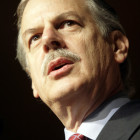We spend almost as much on the military as the rest of the world combined. We're spending more now in comparable dollars than we did at the height of the Cold War under Reagan -- and that's not counting the cost of the three wars we're fighting. We're running an arms race with ourselves, while exhausting resources policing the world. And the military is the largest swamp of waste, fraud and abuse in the federal government. Its books are in such bad shape that they can't be audited. The Pentagon can't keep track of what it has purchased, stored or used.
On the other hand, domestic discretionary spending programs, starved for funds for years, are already headed to levels of the economy not seen since Eisenhower. We have a growing infrastructure investment deficit in everything from transportation to clean water systems to a smart energy grid. We aren't providing students with even the basics in public education. A college education is ever more needed and ever less affordable for more and more Americans. We are chronically short of cops on the beat in our regulatory systems, policing workplace safety, safe food, clean air, financial frauds. We should be increasing investment in these areas, not decreasing them.
Yet the president would cut far less from the Defense budget -- $400-billion over 12 years -- than out of the smaller domestic budget -- $750-billion more over 12 years. He would cut less from the Pentagon than the amount recommended by his Deficit Commission co-chairs.
Income and wealth are more concentrated in America than any time since 1929 and the eve of the Great Depression. The richest 1-percent now captures about 25-percent of the nation's income. Successive tax cuts since Reagan have lowered to levels not seen since 1931.
The wealthiest Americans now pay a lower tax rate, as Warren Buffett has attested, than their secretaries.
Progressive tax reform is long overdue. As Rep. Jan Schakowsky has proposed, we should be extending higher tax rates to millionaires and billionaires, raising the levels at least to those imposed during Reagan's first term in office.
We should be taxing things we need less of -- like financial speculation. A small financial transactions tax would raise more than $100 billion a year while slowing the computerized gambling that now dominates and destabilizes our markets.
Obama sensibly opposes extending the Bush top-end tax cuts and calls for reducing the deductions and loopholes that rich Americans armed with skilled tax lawyers can exploit. But his modest reforms get twice as much deficit reduction from cutting spending than from raising revenues. And the result is a requirement for deep cuts in domestic programs that we should be expanding.
Center Right Debate
Americans support progressive priorities. The most popular measure to reduce the deficit is the millionaire's tax. They prefer cuts in defense to cuts in education. They want Medicare, Medicaid and Social Security protected. Jobs and the economy are a far higher priority than cutting spending. Indeed, the president's greatest vulnerability in his quest for reelection next year will be mass unemployment and stagnant wages. "Where are the jobs" will be the Republican mantra in 2012 just as it was in 2010.
Yet, in Washington, we are having a center-right debate in a center-left nation. A reform president, taking office after the worst economic downturn since the Great Depression, has abandoned any new initiatives on jobs. Policing the world remains the bipartisan consensus priority over rebuilding America. The wealthiest will continue to pay the lowest tax rates since the 1930s, even as investments vital to our future are starved. And that's before the president enters into negotiations with the Tea Party House majority.
The reasons for this retreat are clear. The wealthy and the corporations mobilized big time to protect their privileges. An elite consensus -- congealed in part by conservative financing by Peter Peterson and others -- has helped feed the hysteria about deficits. The conservative Mighty Wurlitzer and the Tea Party zealots have revived right-wing ideas that should have been discredited for a generation by the Great Recession. And money talks louder than ever in our elections, even as it grows more concentrated.
The only way out of this fix is for citizens to organize, for a movement to demand the common sense reforms the country needs and Washington avoids. When there was a bipartisan consensus around the wrongheaded war of choice in Iraq, citizens organized across the world to try to stop it -- and then, having failed, mobilized to bring it to a close. Now that movement must come together again to call Washington to its senses, to defend the American dream, to put people back to work, and to make this economy work for working people once more.
(Note: You can view every article as one long page if you sign up as an Advocate Member, or higher).





